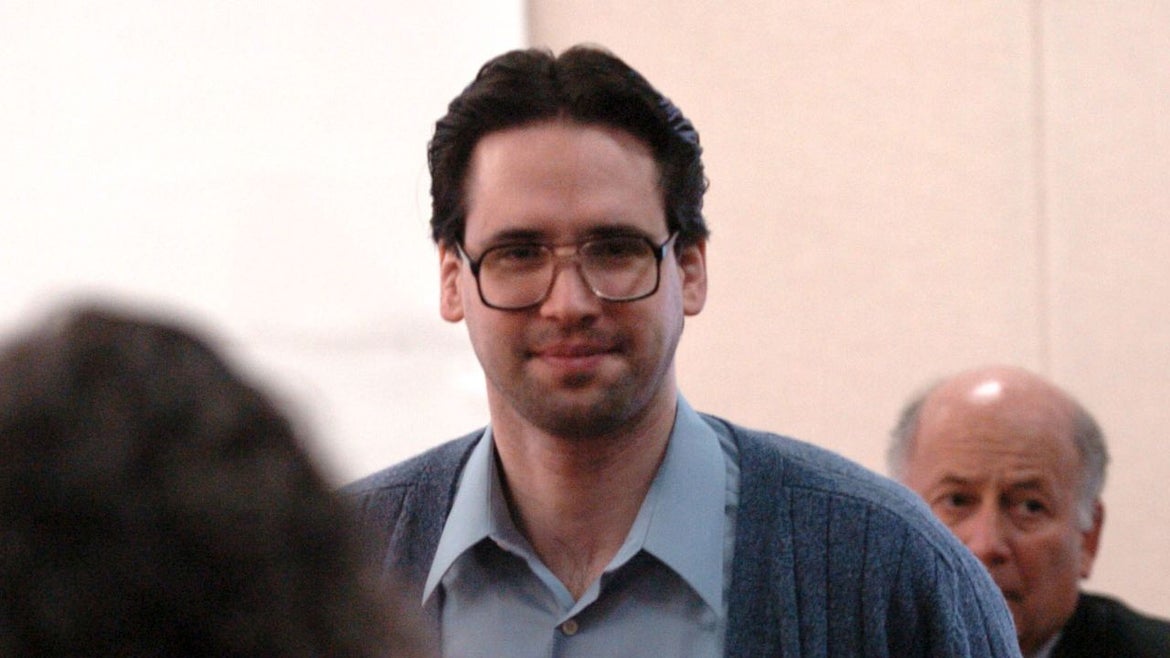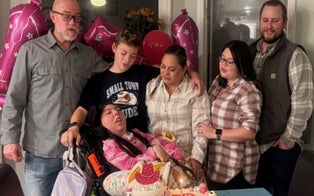Glen Taylor Helzer was convicted in 2002 for the murder of Ivan and Annette Stineman, Selina Bishop, Jennifer Villarin and James Gamble.
The California Supreme Court affirmed the death penalty for a self-proclaimed prophet convicted of murdering five people in 2000.
Glen Taylor Helzer was raised in the Mormon church and practiced the religion into his adulthood. He believed he was a prophet and “told others that killing is sanctioned if it is God’s will,” according to the California Supreme Court’s 85-page ruling issued on Monday. Helzer was eventually excommunicated from the church.
In 1998, Helzer developed the idea to start a self-help group called “Transform America.” It was to be an organization that required an “inner core” of three people, including himself and two others, who had to earn his trust and be loyal to him.
One person testified that an example of loyalty and trust Helzer was looking for was, “If he killed someone and brought the body home, a person would cut up and hide the body without asking a single question,” according to the ruling.
Helzer, his brother Justin, and their friend Dawn Godman moved into a house together in Concord, California. Around this time Helzer came up with “Children of Thunder,” a plan to extort money from one of Helzer’s past clients when he worked as a stockbroker to fund Transform America and “bring about the second coming of Jesus Christ peacefully.”
Helzer identified Ivan and Annette Stineman as former clients of his who had a brokerage portfolio of at least $100,000. Helzer and his brother went on to murder the elderly couple on July 31, 2000.
Helzer then murdered his girlfriend Selina Bishop on August 2, 2000, after using her to deposit money as part of his extortion scheme. After realizing that Bishop’s mother, Jennifer Villarin, could identify him, Helzer and Godman drove to Bishop’s apartment the next day and fatally shot Villarin and Villarin’s friend James Gamble.
The Stinemans' daughter called Concord police fearing her parents were missing after not being able to contact them for four days.
Meanwhile, Marin County Sheriff’s responded to a report at Bishop’s apartment, where they found Villarin and Gamble’s bodies.
A detective learned that Bishop was dating Helzer and obtained a search warrant for his home. Helzer was detained after attempting to flee. Search warrants were issued for Justin and Godman after searching the home.
Authorities recovered nine gym bags containing the victims’ remains that were in the Sacramento-San Joaquin Delta, the court ruling said.
Justin was sentenced to death in 2005 after pleading not guilty by reason of insanity, according to a court docket. He took his own life at San Quentin State Prison in 2013, according to reports.
Godman pleaded guilty and received 38 years to life in prison as part of a plea deal, according to reports.
Helzer was sentenced to death along with his brother in 2005 and his automatic appeal to the death penalty sentence began in 2008, according to a court docket.
His attorney, Jeanne Keevan-Lynch, claimed that during the search of Helzer’s home, Marin County Sheriff's investigators violated his fourth amendment rights by taking materials that weren't included in their search warrant.
“We reject defendant’s claims and conclude blanket suppression of the evidence is not warranted,” the court opinion said.
The court was unpersuaded by Keevan-Lynch’s claim that the court “improperly excused a potential juror,” who wrote that she was not sure she "believe[d] in the death penalty.”
Helzer’s attorney also contended that the trial court abused discretion after a motion was filed to limit photographic evidence of corpse dismemberment after Helzer pleaded guilty. The justices however said they found no error in the admission.
“Here, the disputed photographs shed light on the circumstances of the crimes because, as the trial court reasoned, they were strong evidence of defendant’s consciousness of guilt, the seriousness of his crimes, and the manner of death and subsequent disposal of the victims’ bodies,” the opinion read. “The images depicted the removal of victims’ teeth and identifiable tattoos, which demonstrated defendant’s intent to conceal the identities of his victims.”
Keevan-Lynch declined Inside Edition’s request for comment.
The Contra Costa County District Attorney’s Office says although the Supreme Court of California affirmed Helzer’s 2005 murder convictions, “it does not ease the profound grief endured by those who lost their loved ones.”






